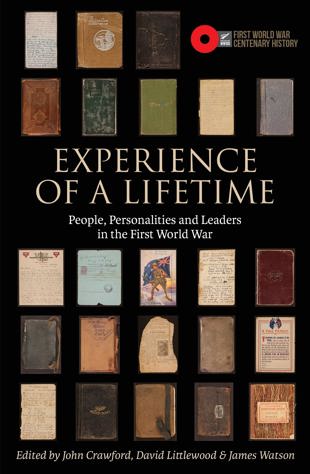The First World War has been thoroughly documented over the past 100 years. But there is scope for deeper understandings of New Zealanders’ experiences of the war, according to editors of a new book exploring first-hand war experiences to be launched by Massey University Press this month.
On that basis, and as part of the Centenary History of New Zealand in the First World War project, Massey’s new press is publishing Experience of a Lifetime: People, Personalities and Leaders in the First World War, a book that furthers our understanding of the conflict and highlights the benefits of war experiences as a research category.
The 352-page book, by New Zealand-based and overseas writers, has five major themes covered in 16 chapters: high-command experiences; soldiers’ experiences; experiences in the air and at sea; imperial experiences; and experiences behind the front line. The primary focus is on the New Zealanders who took part, but not exclusively.
Dr David Littlewood, one of three editors for the volume, introduces the book by saying that the First World War is often depicted as a fundamentally negative historical event. In a provocative inference, he asks readers to consider the contrary view: that it wasn’t all bad.
In this light, one of the major conclusions to emerge from this book is that care is needed when making generalisations about the conflict. Not all 100,000-plus New Zealand soldiers endured the same war, or thought about their shared experiences in an identical way. Many who served were eager for adventure and foreign travel. Many returned home and led meaningful lives. And, for those at home, the First World War became a springboard for racial and gender emancipation.
Dr Littlewood, a history lecturer in the School of Humanities at Massey University’s Manawatū campus, argues that research based on experiences provides “a more nuanced understanding of what being involved in the war entailed.”
War more than death, horror and hardship
“Although hardship and death were all too common, they took place alongside more positive occurrences. For example, the movement of multinational armies across countries and continents gave vast numbers of people the chance to see new parts of the world and led to an unprecedented mixing of cultures. For some this merely reinforced or generated prejudices, but in others it inspired a sense of wonder and respect.
“The conflict also produced countless interactions between people within the armed forces, within other war-related organisations and within local communities,” he writes. “If the consequences could be unfortunate or even provocative, there was a simultaneous formation of bonds, friendships and relationships that would never have happened otherwise.”
He says the orthodox focus on a narrow group of sources and subjects means that “trench warfare on parts of the western front often comes to represent the war as a whole.”
Prominent British military historian Professor Sir Hew Strachan, author of the first chapter, "The Search for Solutions" – an exploration of the “short war illusion” – has cautioned about the history of the First World War, and soldiers’ experiences especially, being written in clichés.
A chapter titled "From Artilleryman to Airman" by Dr Adam Claasen, a historian based at Massey’s Auckland campus in Albany, provides insights into the resilience and adventurous temperament of soldier Keith Park (pictured above), who became one of New Zealand’s top military air commanders.
In his chapter "The New Zealand Soldier of the First World War, 1914-1915" war historian Professor Glyn Harper examines soldiers’ “everyday lives, from training systems and barbed wire, to the use of the bayonet, to gas attacks, rats, food, communal singing and infectious diseases.” It is based on research for his book Johnny Enzed: The New Zealand Soldier in the First World War 1914-1918, published last year.
Book challenges preconceived ideas of war
Through the book we also meet, among others:
- The crack sniper Captain Jesse Wallingford, who impersonated a British officer at Gallipoli in order to save his men from a rout.
- The Fijian Wanganui Collegiate old boy Ratu Sukuna, who served in the French Foreign Legion
- The Ottoman officer Esat Pasha, who organised the scrambled initial defence at Gallipoli.
- Chunuk Bair hero William Malone, and mule corps cooper Naran Sammey, who shared a blanket and a dry shelter on a rainy night in May at Cape Helles.
- The motor mechanics who formed the backbone of what would later become our Navy.
- The soldier who was blinded at Gallipoli and went on to edit the newspaper that kept the troops in touch with each other and with home.
Co-editors are Associate Professor James Watson, a history lecturer at Massey University, and John Crawford, the New Zealand Defence Force Historian and a member of the Governance Group of the First World War Centennial History Programme.
Publisher Nicola Legat says, “Massey University Press is very proud to publish Experience of A Lifetime. It’s an enjoyable and enriching read that challenges many of our preconceived notions about the war and introduces us to a range of remarkable individuals. We congratulate the editors and contributing writers.”
Experience of a Lifetime will be launched on April 11, 5.30 – 7.30pm at the Palmerston North Central City Library. It is available at $39.99 from all good bookstores and also directly from Massey University Press: www.masseypress.ac.nz.
This article was first published on the Massey University Website.
www.massey.ac.nz
To attend the launch of Experience of a Lifetime please RSVP at massey.ac.nz/eoal


